ACC300 Auditing & Assurance: Assessing Threats to Auditor Independence
VerifiedAdded on 2023/06/12
|10
|2614
|75
Homework Assignment
AI Summary
This assignment solution addresses several scenarios involving potential violations of ethical principles as outlined in APES 110 and threats to auditor independence. It analyzes situations such as accepting gifts from clients, conflicts of interest, and breaches of confidentiality, providing detailed explanations of whether ethical principles are violated and why. The solution also examines threats to independence arising from financial interests, undue influence, and non-compliance with accounting standards, offering insights into the implications for audit opinions and professional judgment. The document is available on Desklib, a platform offering a range of study resources for students.
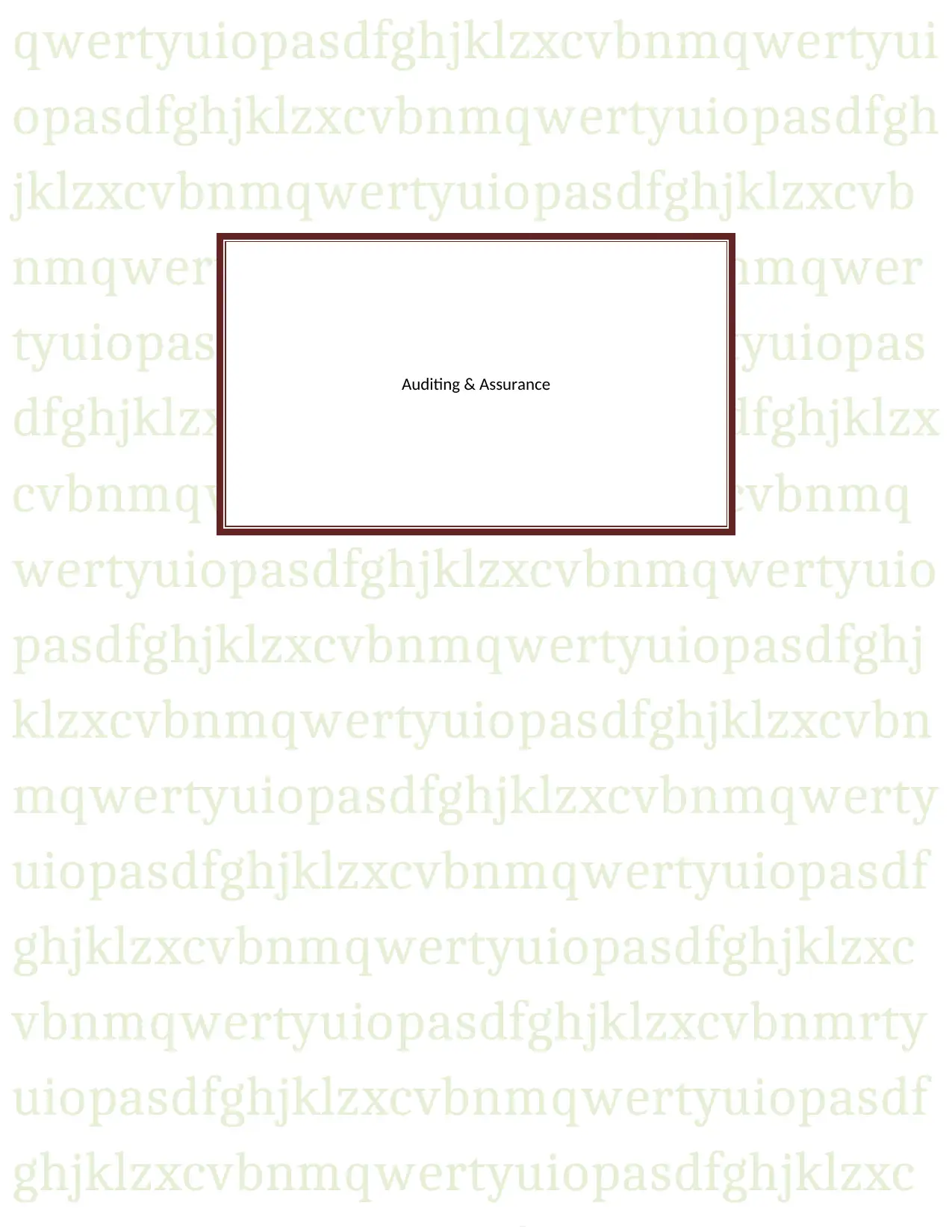
qwertyuiopasdfghjklzxcvbnmqwertyui
opasdfghjklzxcvbnmqwertyuiopasdfgh
jklzxcvbnmqwertyuiopasdfghjklzxcvb
nmqwertyuiopasdfghjklzxcvbnmqwer
tyuiopasdfghjklzxcvbnmqwertyuiopas
dfghjklzxcvbnmqwertyuiopasdfghjklzx
cvbnmqwertyuiopasdfghjklzxcvbnmq
wertyuiopasdfghjklzxcvbnmqwertyuio
pasdfghjklzxcvbnmqwertyuiopasdfghj
klzxcvbnmqwertyuiopasdfghjklzxcvbn
mqwertyuiopasdfghjklzxcvbnmqwerty
uiopasdfghjklzxcvbnmqwertyuiopasdf
ghjklzxcvbnmqwertyuiopasdfghjklzxc
vbnmqwertyuiopasdfghjklzxcvbnmrty
uiopasdfghjklzxcvbnmqwertyuiopasdf
ghjklzxcvbnmqwertyuiopasdfghjklzxc
Auditing & Assurance
opasdfghjklzxcvbnmqwertyuiopasdfgh
jklzxcvbnmqwertyuiopasdfghjklzxcvb
nmqwertyuiopasdfghjklzxcvbnmqwer
tyuiopasdfghjklzxcvbnmqwertyuiopas
dfghjklzxcvbnmqwertyuiopasdfghjklzx
cvbnmqwertyuiopasdfghjklzxcvbnmq
wertyuiopasdfghjklzxcvbnmqwertyuio
pasdfghjklzxcvbnmqwertyuiopasdfghj
klzxcvbnmqwertyuiopasdfghjklzxcvbn
mqwertyuiopasdfghjklzxcvbnmqwerty
uiopasdfghjklzxcvbnmqwertyuiopasdf
ghjklzxcvbnmqwertyuiopasdfghjklzxc
vbnmqwertyuiopasdfghjklzxcvbnmrty
uiopasdfghjklzxcvbnmqwertyuiopasdf
ghjklzxcvbnmqwertyuiopasdfghjklzxc
Auditing & Assurance
Paraphrase This Document
Need a fresh take? Get an instant paraphrase of this document with our AI Paraphraser
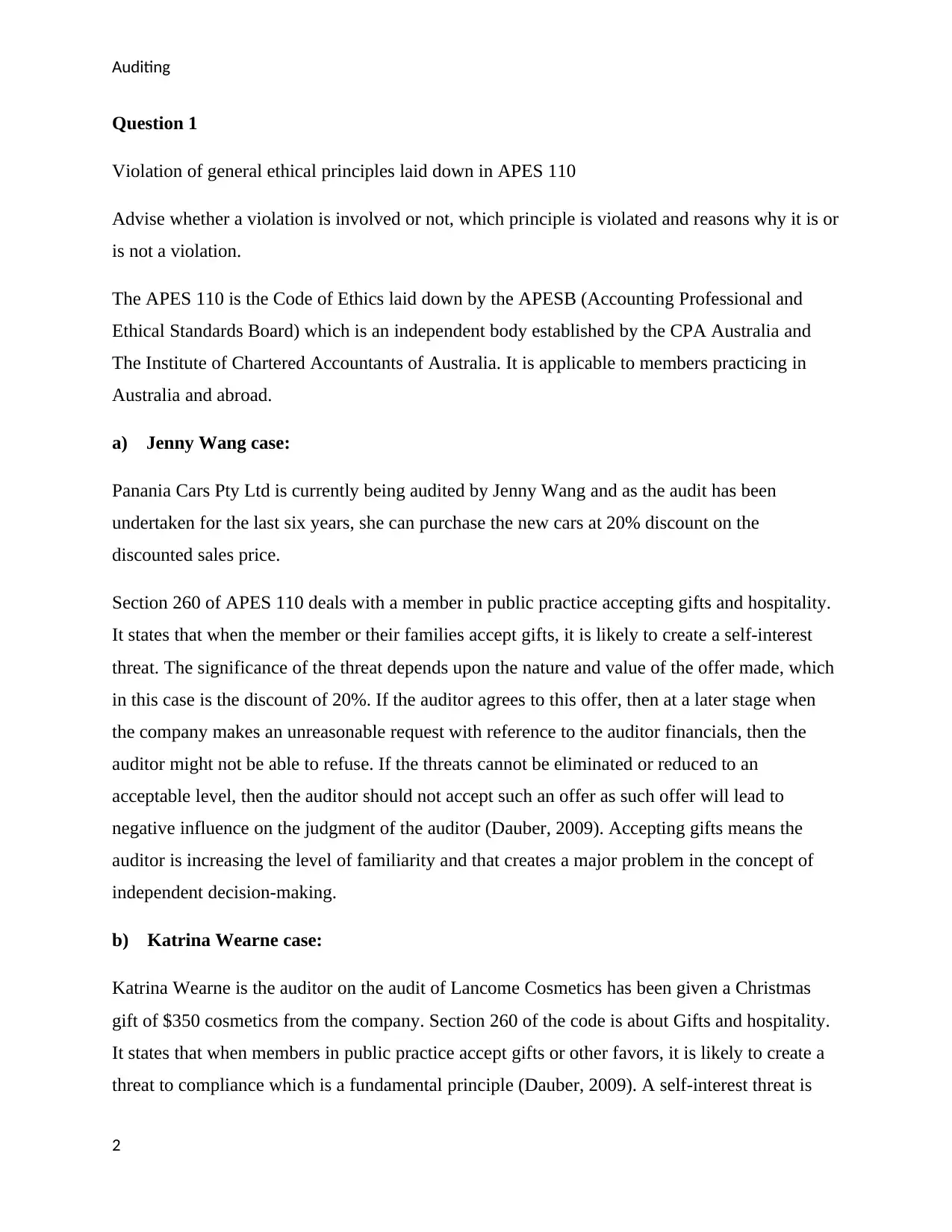
Auditing
Question 1
Violation of general ethical principles laid down in APES 110
Advise whether a violation is involved or not, which principle is violated and reasons why it is or
is not a violation.
The APES 110 is the Code of Ethics laid down by the APESB (Accounting Professional and
Ethical Standards Board) which is an independent body established by the CPA Australia and
The Institute of Chartered Accountants of Australia. It is applicable to members practicing in
Australia and abroad.
a) Jenny Wang case:
Panania Cars Pty Ltd is currently being audited by Jenny Wang and as the audit has been
undertaken for the last six years, she can purchase the new cars at 20% discount on the
discounted sales price.
Section 260 of APES 110 deals with a member in public practice accepting gifts and hospitality.
It states that when the member or their families accept gifts, it is likely to create a self-interest
threat. The significance of the threat depends upon the nature and value of the offer made, which
in this case is the discount of 20%. If the auditor agrees to this offer, then at a later stage when
the company makes an unreasonable request with reference to the auditor financials, then the
auditor might not be able to refuse. If the threats cannot be eliminated or reduced to an
acceptable level, then the auditor should not accept such an offer as such offer will lead to
negative influence on the judgment of the auditor (Dauber, 2009). Accepting gifts means the
auditor is increasing the level of familiarity and that creates a major problem in the concept of
independent decision-making.
b) Katrina Wearne case:
Katrina Wearne is the auditor on the audit of Lancome Cosmetics has been given a Christmas
gift of $350 cosmetics from the company. Section 260 of the code is about Gifts and hospitality.
It states that when members in public practice accept gifts or other favors, it is likely to create a
threat to compliance which is a fundamental principle (Dauber, 2009). A self-interest threat is
2
Question 1
Violation of general ethical principles laid down in APES 110
Advise whether a violation is involved or not, which principle is violated and reasons why it is or
is not a violation.
The APES 110 is the Code of Ethics laid down by the APESB (Accounting Professional and
Ethical Standards Board) which is an independent body established by the CPA Australia and
The Institute of Chartered Accountants of Australia. It is applicable to members practicing in
Australia and abroad.
a) Jenny Wang case:
Panania Cars Pty Ltd is currently being audited by Jenny Wang and as the audit has been
undertaken for the last six years, she can purchase the new cars at 20% discount on the
discounted sales price.
Section 260 of APES 110 deals with a member in public practice accepting gifts and hospitality.
It states that when the member or their families accept gifts, it is likely to create a self-interest
threat. The significance of the threat depends upon the nature and value of the offer made, which
in this case is the discount of 20%. If the auditor agrees to this offer, then at a later stage when
the company makes an unreasonable request with reference to the auditor financials, then the
auditor might not be able to refuse. If the threats cannot be eliminated or reduced to an
acceptable level, then the auditor should not accept such an offer as such offer will lead to
negative influence on the judgment of the auditor (Dauber, 2009). Accepting gifts means the
auditor is increasing the level of familiarity and that creates a major problem in the concept of
independent decision-making.
b) Katrina Wearne case:
Katrina Wearne is the auditor on the audit of Lancome Cosmetics has been given a Christmas
gift of $350 cosmetics from the company. Section 260 of the code is about Gifts and hospitality.
It states that when members in public practice accept gifts or other favors, it is likely to create a
threat to compliance which is a fundamental principle (Dauber, 2009). A self-interest threat is
2
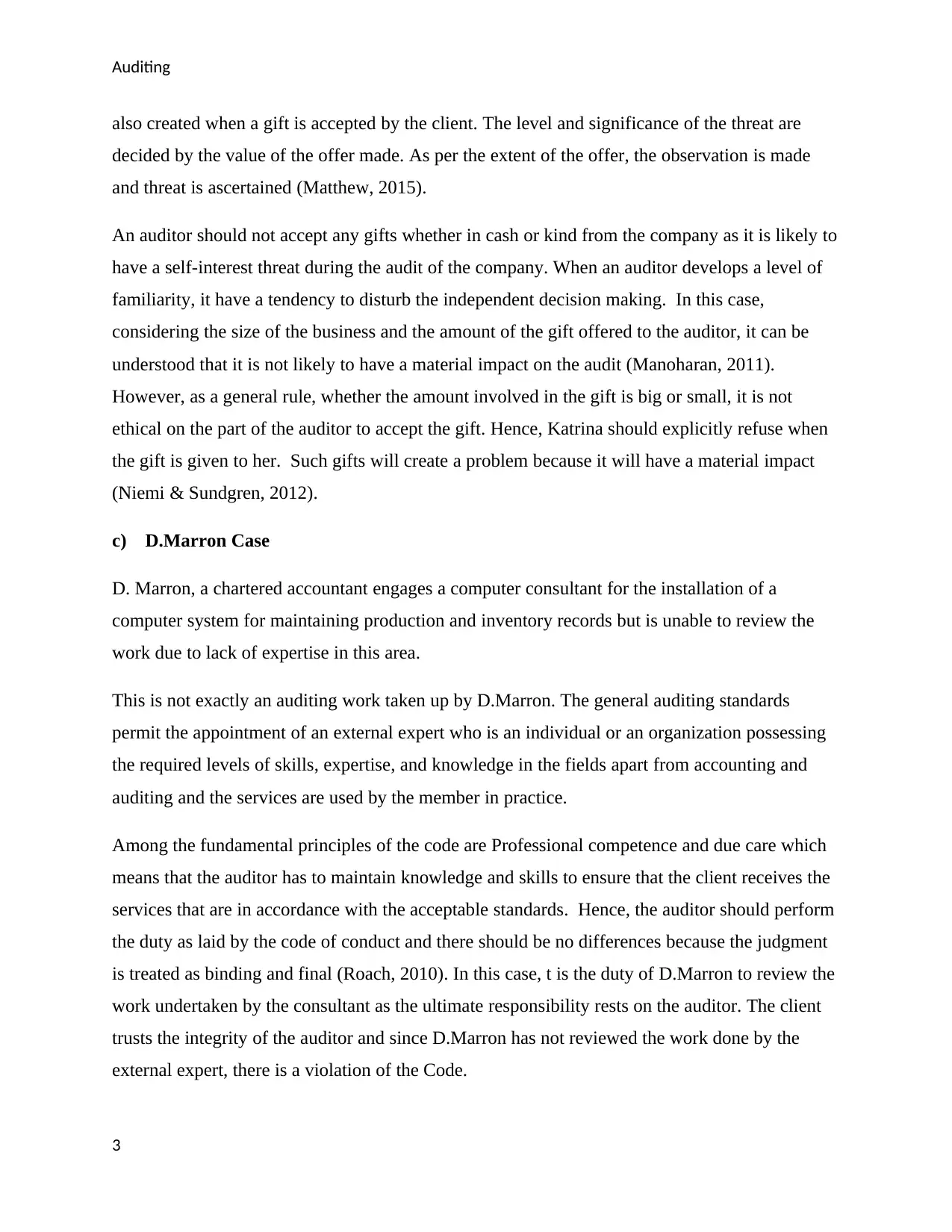
Auditing
also created when a gift is accepted by the client. The level and significance of the threat are
decided by the value of the offer made. As per the extent of the offer, the observation is made
and threat is ascertained (Matthew, 2015).
An auditor should not accept any gifts whether in cash or kind from the company as it is likely to
have a self-interest threat during the audit of the company. When an auditor develops a level of
familiarity, it have a tendency to disturb the independent decision making. In this case,
considering the size of the business and the amount of the gift offered to the auditor, it can be
understood that it is not likely to have a material impact on the audit (Manoharan, 2011).
However, as a general rule, whether the amount involved in the gift is big or small, it is not
ethical on the part of the auditor to accept the gift. Hence, Katrina should explicitly refuse when
the gift is given to her. Such gifts will create a problem because it will have a material impact
(Niemi & Sundgren, 2012).
c) D.Marron Case
D. Marron, a chartered accountant engages a computer consultant for the installation of a
computer system for maintaining production and inventory records but is unable to review the
work due to lack of expertise in this area.
This is not exactly an auditing work taken up by D.Marron. The general auditing standards
permit the appointment of an external expert who is an individual or an organization possessing
the required levels of skills, expertise, and knowledge in the fields apart from accounting and
auditing and the services are used by the member in practice.
Among the fundamental principles of the code are Professional competence and due care which
means that the auditor has to maintain knowledge and skills to ensure that the client receives the
services that are in accordance with the acceptable standards. Hence, the auditor should perform
the duty as laid by the code of conduct and there should be no differences because the judgment
is treated as binding and final (Roach, 2010). In this case, t is the duty of D.Marron to review the
work undertaken by the consultant as the ultimate responsibility rests on the auditor. The client
trusts the integrity of the auditor and since D.Marron has not reviewed the work done by the
external expert, there is a violation of the Code.
3
also created when a gift is accepted by the client. The level and significance of the threat are
decided by the value of the offer made. As per the extent of the offer, the observation is made
and threat is ascertained (Matthew, 2015).
An auditor should not accept any gifts whether in cash or kind from the company as it is likely to
have a self-interest threat during the audit of the company. When an auditor develops a level of
familiarity, it have a tendency to disturb the independent decision making. In this case,
considering the size of the business and the amount of the gift offered to the auditor, it can be
understood that it is not likely to have a material impact on the audit (Manoharan, 2011).
However, as a general rule, whether the amount involved in the gift is big or small, it is not
ethical on the part of the auditor to accept the gift. Hence, Katrina should explicitly refuse when
the gift is given to her. Such gifts will create a problem because it will have a material impact
(Niemi & Sundgren, 2012).
c) D.Marron Case
D. Marron, a chartered accountant engages a computer consultant for the installation of a
computer system for maintaining production and inventory records but is unable to review the
work due to lack of expertise in this area.
This is not exactly an auditing work taken up by D.Marron. The general auditing standards
permit the appointment of an external expert who is an individual or an organization possessing
the required levels of skills, expertise, and knowledge in the fields apart from accounting and
auditing and the services are used by the member in practice.
Among the fundamental principles of the code are Professional competence and due care which
means that the auditor has to maintain knowledge and skills to ensure that the client receives the
services that are in accordance with the acceptable standards. Hence, the auditor should perform
the duty as laid by the code of conduct and there should be no differences because the judgment
is treated as binding and final (Roach, 2010). In this case, t is the duty of D.Marron to review the
work undertaken by the consultant as the ultimate responsibility rests on the auditor. The client
trusts the integrity of the auditor and since D.Marron has not reviewed the work done by the
external expert, there is a violation of the Code.
3
⊘ This is a preview!⊘
Do you want full access?
Subscribe today to unlock all pages.

Trusted by 1+ million students worldwide
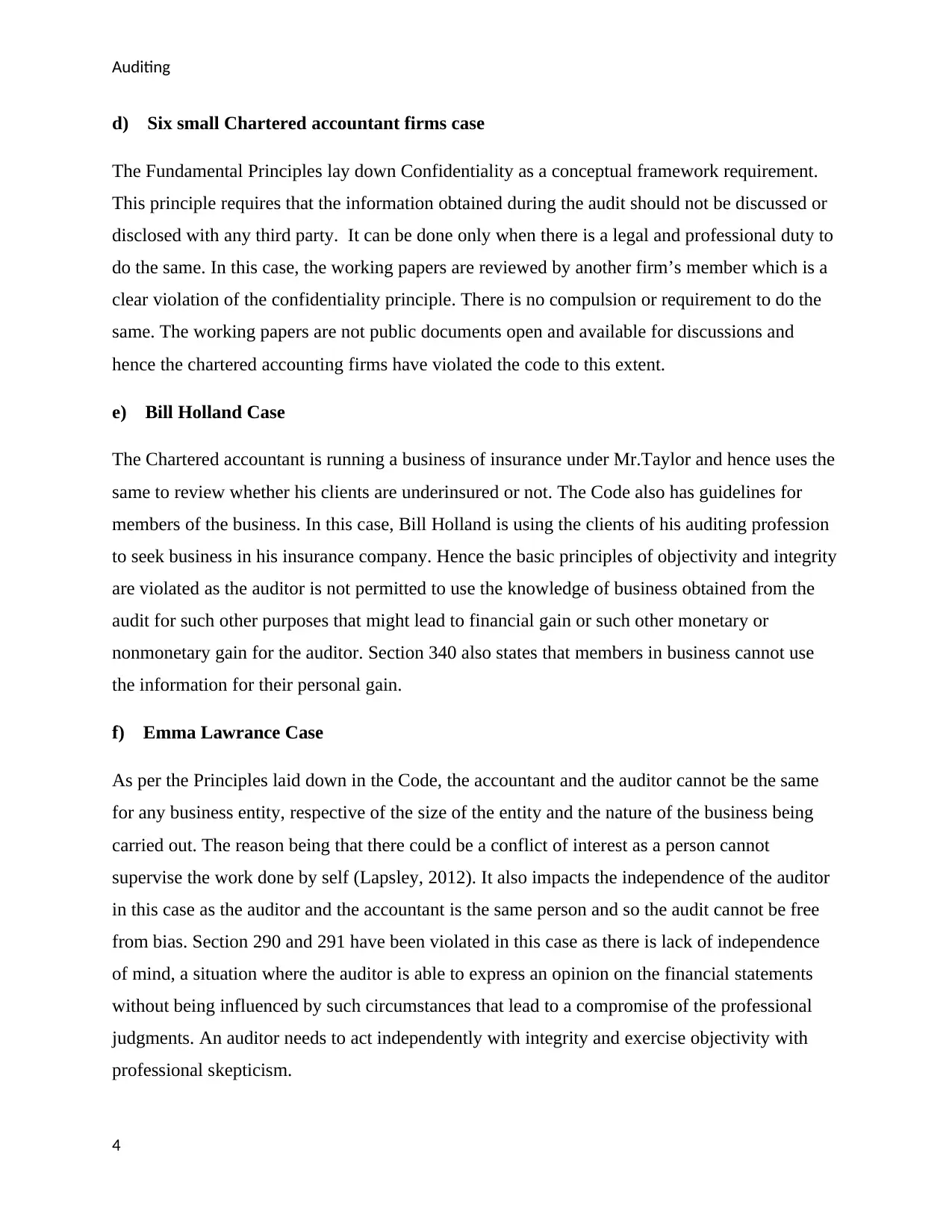
Auditing
d) Six small Chartered accountant firms case
The Fundamental Principles lay down Confidentiality as a conceptual framework requirement.
This principle requires that the information obtained during the audit should not be discussed or
disclosed with any third party. It can be done only when there is a legal and professional duty to
do the same. In this case, the working papers are reviewed by another firm’s member which is a
clear violation of the confidentiality principle. There is no compulsion or requirement to do the
same. The working papers are not public documents open and available for discussions and
hence the chartered accounting firms have violated the code to this extent.
e) Bill Holland Case
The Chartered accountant is running a business of insurance under Mr.Taylor and hence uses the
same to review whether his clients are underinsured or not. The Code also has guidelines for
members of the business. In this case, Bill Holland is using the clients of his auditing profession
to seek business in his insurance company. Hence the basic principles of objectivity and integrity
are violated as the auditor is not permitted to use the knowledge of business obtained from the
audit for such other purposes that might lead to financial gain or such other monetary or
nonmonetary gain for the auditor. Section 340 also states that members in business cannot use
the information for their personal gain.
f) Emma Lawrance Case
As per the Principles laid down in the Code, the accountant and the auditor cannot be the same
for any business entity, respective of the size of the entity and the nature of the business being
carried out. The reason being that there could be a conflict of interest as a person cannot
supervise the work done by self (Lapsley, 2012). It also impacts the independence of the auditor
in this case as the auditor and the accountant is the same person and so the audit cannot be free
from bias. Section 290 and 291 have been violated in this case as there is lack of independence
of mind, a situation where the auditor is able to express an opinion on the financial statements
without being influenced by such circumstances that lead to a compromise of the professional
judgments. An auditor needs to act independently with integrity and exercise objectivity with
professional skepticism.
4
d) Six small Chartered accountant firms case
The Fundamental Principles lay down Confidentiality as a conceptual framework requirement.
This principle requires that the information obtained during the audit should not be discussed or
disclosed with any third party. It can be done only when there is a legal and professional duty to
do the same. In this case, the working papers are reviewed by another firm’s member which is a
clear violation of the confidentiality principle. There is no compulsion or requirement to do the
same. The working papers are not public documents open and available for discussions and
hence the chartered accounting firms have violated the code to this extent.
e) Bill Holland Case
The Chartered accountant is running a business of insurance under Mr.Taylor and hence uses the
same to review whether his clients are underinsured or not. The Code also has guidelines for
members of the business. In this case, Bill Holland is using the clients of his auditing profession
to seek business in his insurance company. Hence the basic principles of objectivity and integrity
are violated as the auditor is not permitted to use the knowledge of business obtained from the
audit for such other purposes that might lead to financial gain or such other monetary or
nonmonetary gain for the auditor. Section 340 also states that members in business cannot use
the information for their personal gain.
f) Emma Lawrance Case
As per the Principles laid down in the Code, the accountant and the auditor cannot be the same
for any business entity, respective of the size of the entity and the nature of the business being
carried out. The reason being that there could be a conflict of interest as a person cannot
supervise the work done by self (Lapsley, 2012). It also impacts the independence of the auditor
in this case as the auditor and the accountant is the same person and so the audit cannot be free
from bias. Section 290 and 291 have been violated in this case as there is lack of independence
of mind, a situation where the auditor is able to express an opinion on the financial statements
without being influenced by such circumstances that lead to a compromise of the professional
judgments. An auditor needs to act independently with integrity and exercise objectivity with
professional skepticism.
4
Paraphrase This Document
Need a fresh take? Get an instant paraphrase of this document with our AI Paraphraser
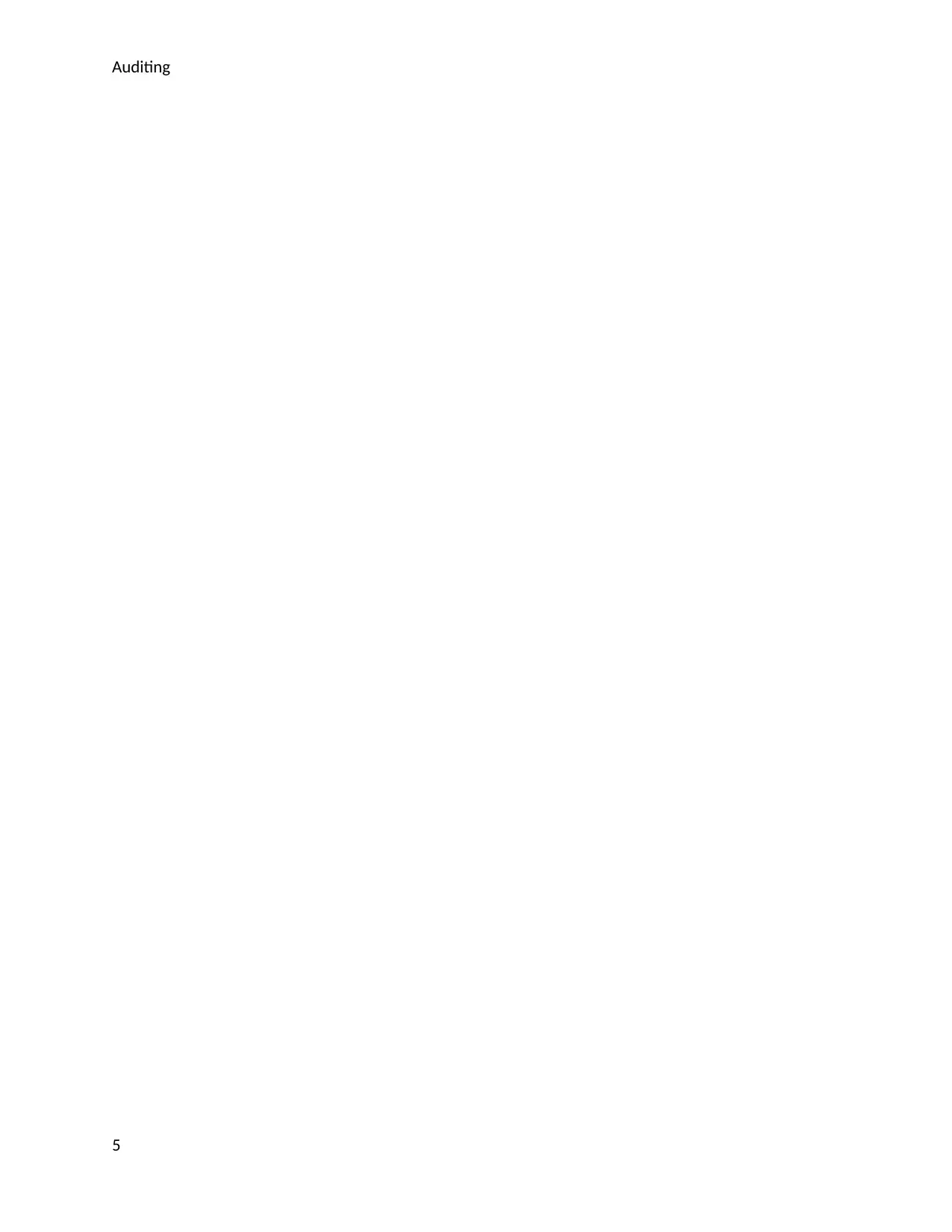
Auditing
5
5
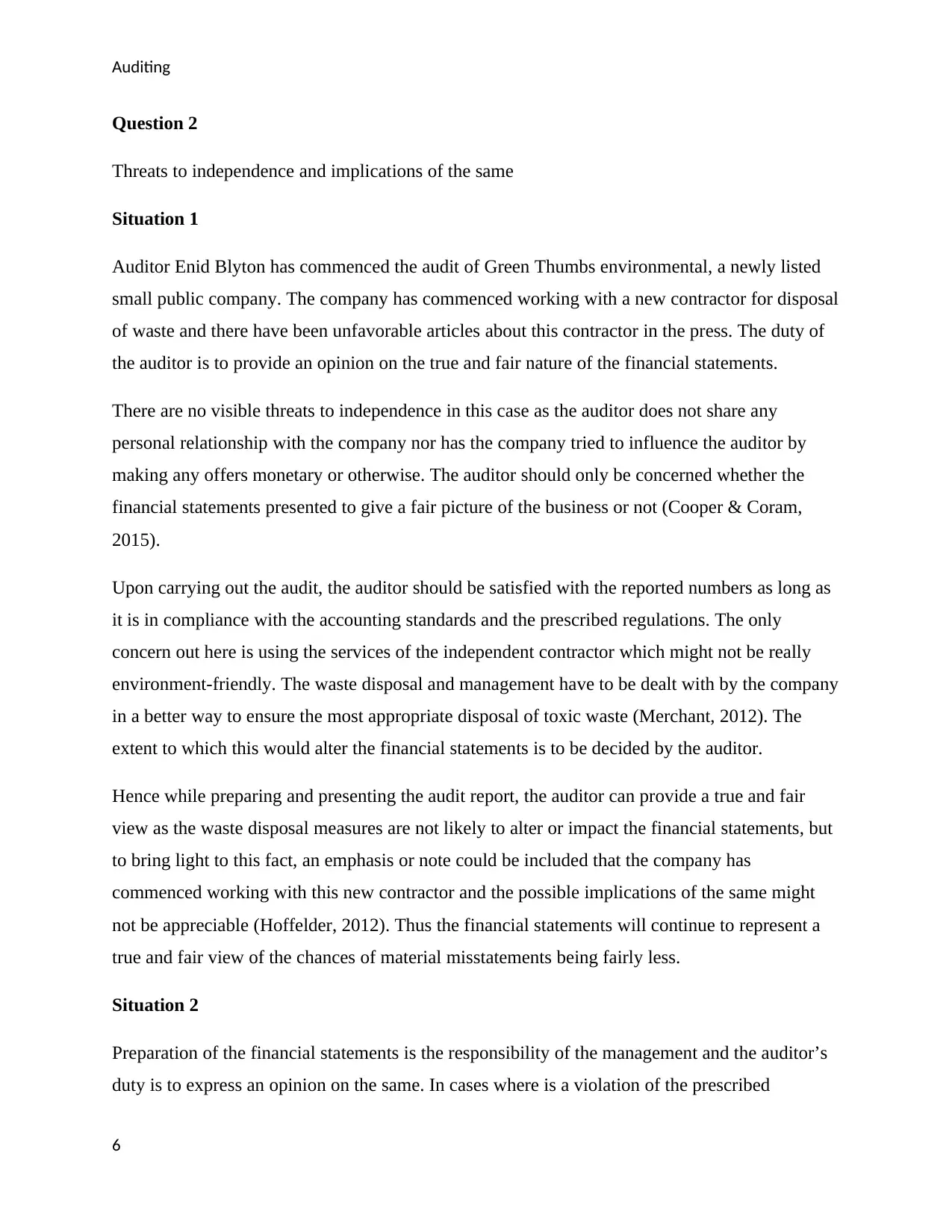
Auditing
Question 2
Threats to independence and implications of the same
Situation 1
Auditor Enid Blyton has commenced the audit of Green Thumbs environmental, a newly listed
small public company. The company has commenced working with a new contractor for disposal
of waste and there have been unfavorable articles about this contractor in the press. The duty of
the auditor is to provide an opinion on the true and fair nature of the financial statements.
There are no visible threats to independence in this case as the auditor does not share any
personal relationship with the company nor has the company tried to influence the auditor by
making any offers monetary or otherwise. The auditor should only be concerned whether the
financial statements presented to give a fair picture of the business or not (Cooper & Coram,
2015).
Upon carrying out the audit, the auditor should be satisfied with the reported numbers as long as
it is in compliance with the accounting standards and the prescribed regulations. The only
concern out here is using the services of the independent contractor which might not be really
environment-friendly. The waste disposal and management have to be dealt with by the company
in a better way to ensure the most appropriate disposal of toxic waste (Merchant, 2012). The
extent to which this would alter the financial statements is to be decided by the auditor.
Hence while preparing and presenting the audit report, the auditor can provide a true and fair
view as the waste disposal measures are not likely to alter or impact the financial statements, but
to bring light to this fact, an emphasis or note could be included that the company has
commenced working with this new contractor and the possible implications of the same might
not be appreciable (Hoffelder, 2012). Thus the financial statements will continue to represent a
true and fair view of the chances of material misstatements being fairly less.
Situation 2
Preparation of the financial statements is the responsibility of the management and the auditor’s
duty is to express an opinion on the same. In cases where is a violation of the prescribed
6
Question 2
Threats to independence and implications of the same
Situation 1
Auditor Enid Blyton has commenced the audit of Green Thumbs environmental, a newly listed
small public company. The company has commenced working with a new contractor for disposal
of waste and there have been unfavorable articles about this contractor in the press. The duty of
the auditor is to provide an opinion on the true and fair nature of the financial statements.
There are no visible threats to independence in this case as the auditor does not share any
personal relationship with the company nor has the company tried to influence the auditor by
making any offers monetary or otherwise. The auditor should only be concerned whether the
financial statements presented to give a fair picture of the business or not (Cooper & Coram,
2015).
Upon carrying out the audit, the auditor should be satisfied with the reported numbers as long as
it is in compliance with the accounting standards and the prescribed regulations. The only
concern out here is using the services of the independent contractor which might not be really
environment-friendly. The waste disposal and management have to be dealt with by the company
in a better way to ensure the most appropriate disposal of toxic waste (Merchant, 2012). The
extent to which this would alter the financial statements is to be decided by the auditor.
Hence while preparing and presenting the audit report, the auditor can provide a true and fair
view as the waste disposal measures are not likely to alter or impact the financial statements, but
to bring light to this fact, an emphasis or note could be included that the company has
commenced working with this new contractor and the possible implications of the same might
not be appreciable (Hoffelder, 2012). Thus the financial statements will continue to represent a
true and fair view of the chances of material misstatements being fairly less.
Situation 2
Preparation of the financial statements is the responsibility of the management and the auditor’s
duty is to express an opinion on the same. In cases where is a violation of the prescribed
6
⊘ This is a preview!⊘
Do you want full access?
Subscribe today to unlock all pages.

Trusted by 1+ million students worldwide
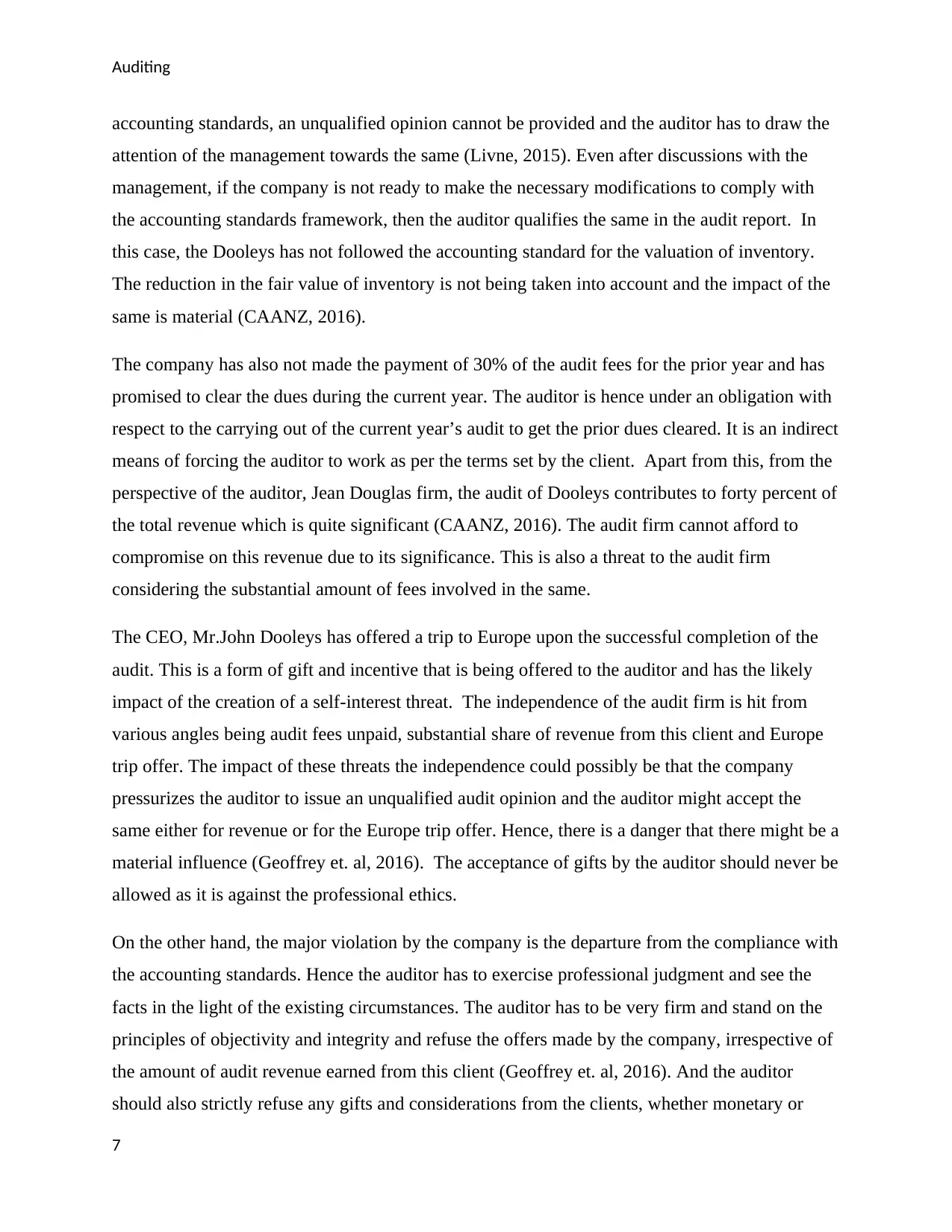
Auditing
accounting standards, an unqualified opinion cannot be provided and the auditor has to draw the
attention of the management towards the same (Livne, 2015). Even after discussions with the
management, if the company is not ready to make the necessary modifications to comply with
the accounting standards framework, then the auditor qualifies the same in the audit report. In
this case, the Dooleys has not followed the accounting standard for the valuation of inventory.
The reduction in the fair value of inventory is not being taken into account and the impact of the
same is material (CAANZ, 2016).
The company has also not made the payment of 30% of the audit fees for the prior year and has
promised to clear the dues during the current year. The auditor is hence under an obligation with
respect to the carrying out of the current year’s audit to get the prior dues cleared. It is an indirect
means of forcing the auditor to work as per the terms set by the client. Apart from this, from the
perspective of the auditor, Jean Douglas firm, the audit of Dooleys contributes to forty percent of
the total revenue which is quite significant (CAANZ, 2016). The audit firm cannot afford to
compromise on this revenue due to its significance. This is also a threat to the audit firm
considering the substantial amount of fees involved in the same.
The CEO, Mr.John Dooleys has offered a trip to Europe upon the successful completion of the
audit. This is a form of gift and incentive that is being offered to the auditor and has the likely
impact of the creation of a self-interest threat. The independence of the audit firm is hit from
various angles being audit fees unpaid, substantial share of revenue from this client and Europe
trip offer. The impact of these threats the independence could possibly be that the company
pressurizes the auditor to issue an unqualified audit opinion and the auditor might accept the
same either for revenue or for the Europe trip offer. Hence, there is a danger that there might be a
material influence (Geoffrey et. al, 2016). The acceptance of gifts by the auditor should never be
allowed as it is against the professional ethics.
On the other hand, the major violation by the company is the departure from the compliance with
the accounting standards. Hence the auditor has to exercise professional judgment and see the
facts in the light of the existing circumstances. The auditor has to be very firm and stand on the
principles of objectivity and integrity and refuse the offers made by the company, irrespective of
the amount of audit revenue earned from this client (Geoffrey et. al, 2016). And the auditor
should also strictly refuse any gifts and considerations from the clients, whether monetary or
7
accounting standards, an unqualified opinion cannot be provided and the auditor has to draw the
attention of the management towards the same (Livne, 2015). Even after discussions with the
management, if the company is not ready to make the necessary modifications to comply with
the accounting standards framework, then the auditor qualifies the same in the audit report. In
this case, the Dooleys has not followed the accounting standard for the valuation of inventory.
The reduction in the fair value of inventory is not being taken into account and the impact of the
same is material (CAANZ, 2016).
The company has also not made the payment of 30% of the audit fees for the prior year and has
promised to clear the dues during the current year. The auditor is hence under an obligation with
respect to the carrying out of the current year’s audit to get the prior dues cleared. It is an indirect
means of forcing the auditor to work as per the terms set by the client. Apart from this, from the
perspective of the auditor, Jean Douglas firm, the audit of Dooleys contributes to forty percent of
the total revenue which is quite significant (CAANZ, 2016). The audit firm cannot afford to
compromise on this revenue due to its significance. This is also a threat to the audit firm
considering the substantial amount of fees involved in the same.
The CEO, Mr.John Dooleys has offered a trip to Europe upon the successful completion of the
audit. This is a form of gift and incentive that is being offered to the auditor and has the likely
impact of the creation of a self-interest threat. The independence of the audit firm is hit from
various angles being audit fees unpaid, substantial share of revenue from this client and Europe
trip offer. The impact of these threats the independence could possibly be that the company
pressurizes the auditor to issue an unqualified audit opinion and the auditor might accept the
same either for revenue or for the Europe trip offer. Hence, there is a danger that there might be a
material influence (Geoffrey et. al, 2016). The acceptance of gifts by the auditor should never be
allowed as it is against the professional ethics.
On the other hand, the major violation by the company is the departure from the compliance with
the accounting standards. Hence the auditor has to exercise professional judgment and see the
facts in the light of the existing circumstances. The auditor has to be very firm and stand on the
principles of objectivity and integrity and refuse the offers made by the company, irrespective of
the amount of audit revenue earned from this client (Geoffrey et. al, 2016). And the auditor
should also strictly refuse any gifts and considerations from the clients, whether monetary or
7
Paraphrase This Document
Need a fresh take? Get an instant paraphrase of this document with our AI Paraphraser
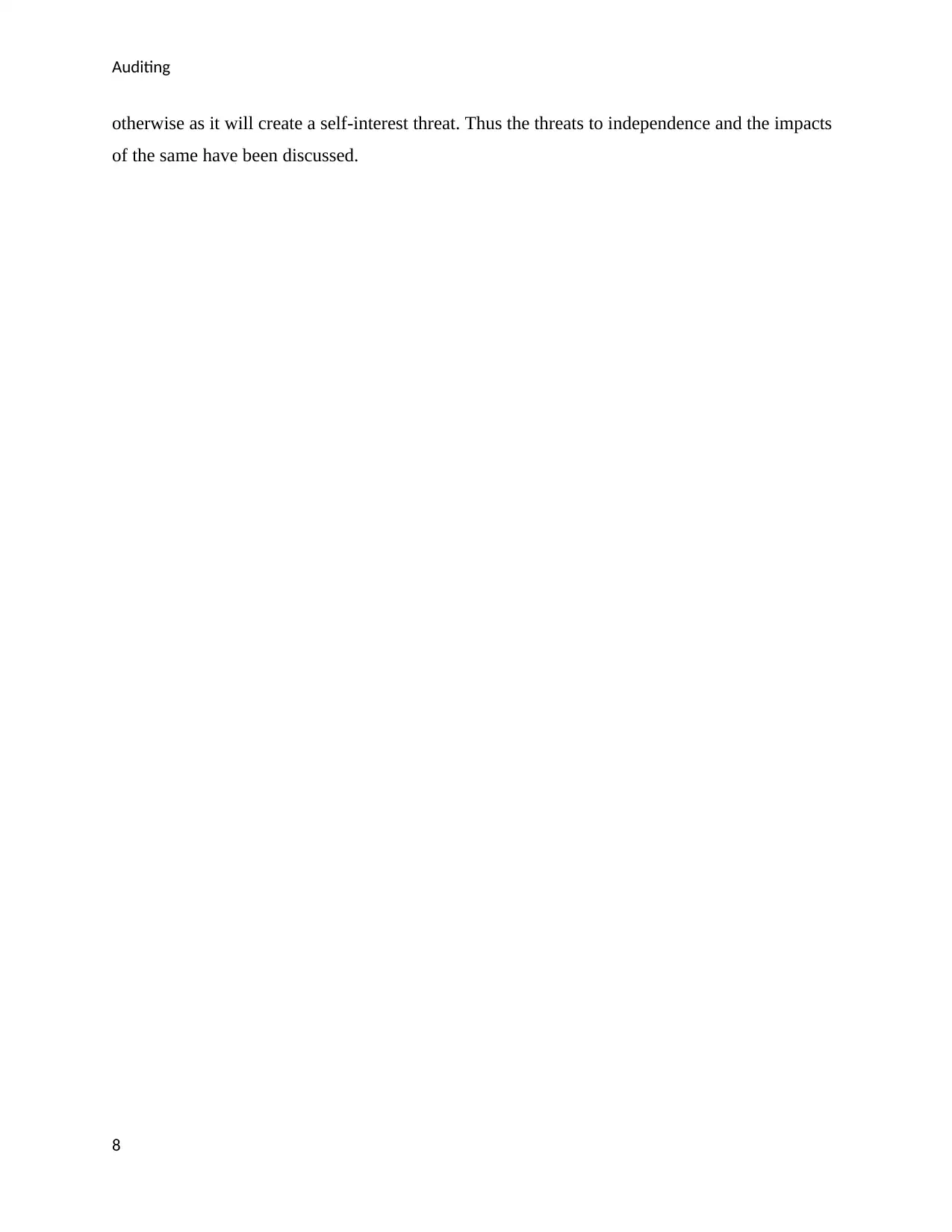
Auditing
otherwise as it will create a self-interest threat. Thus the threats to independence and the impacts
of the same have been discussed.
8
otherwise as it will create a self-interest threat. Thus the threats to independence and the impacts
of the same have been discussed.
8
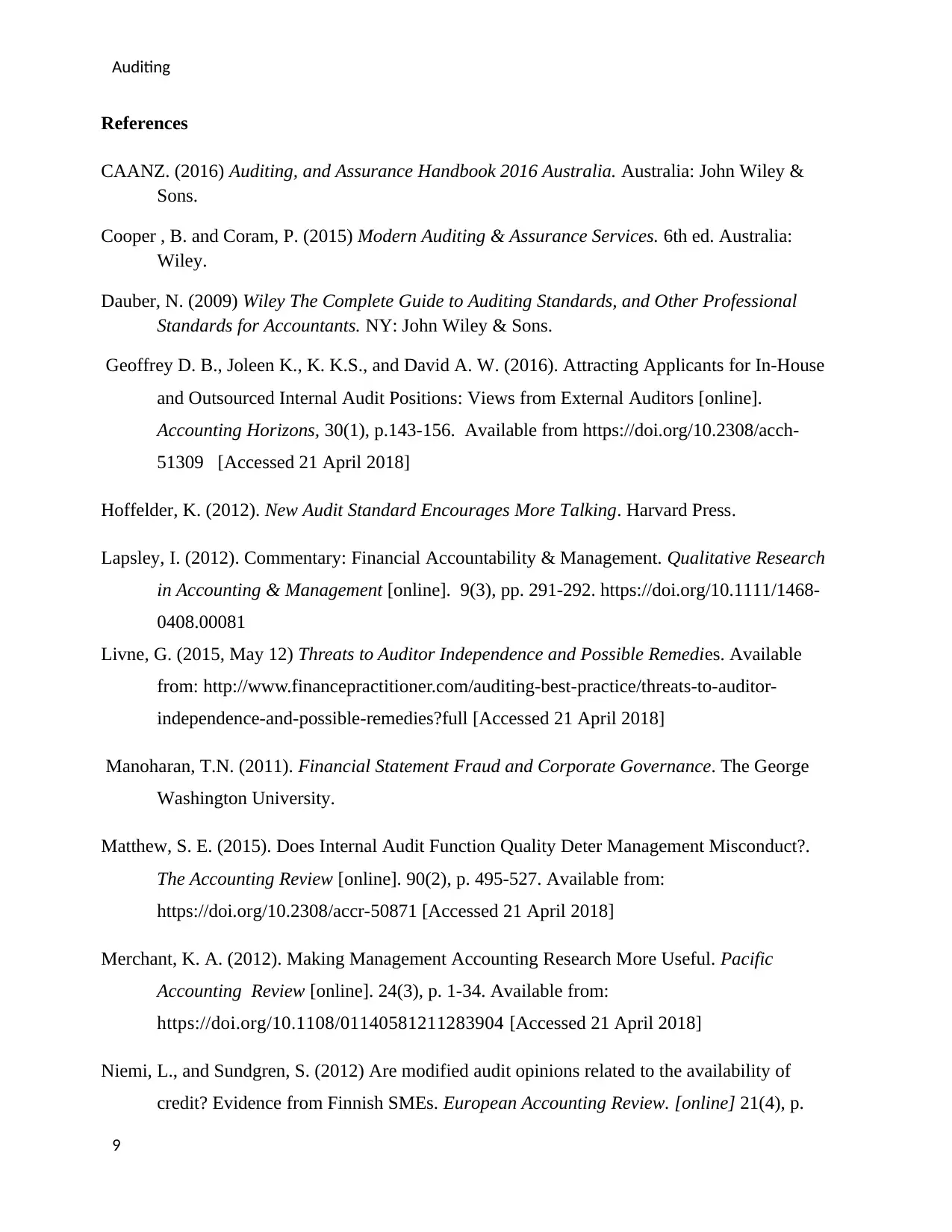
Auditing
References
CAANZ. (2016) Auditing, and Assurance Handbook 2016 Australia. Australia: John Wiley &
Sons.
Cooper , B. and Coram, P. (2015) Modern Auditing & Assurance Services. 6th ed. Australia:
Wiley.
Dauber, N. (2009) Wiley The Complete Guide to Auditing Standards, and Other Professional
Standards for Accountants. NY: John Wiley & Sons.
Geoffrey D. B., Joleen K., K. K.S., and David A. W. (2016). Attracting Applicants for In-House
and Outsourced Internal Audit Positions: Views from External Auditors [online].
Accounting Horizons, 30(1), p.143-156. Available from https://doi.org/10.2308/acch-
51309 [Accessed 21 April 2018]
Hoffelder, K. (2012). New Audit Standard Encourages More Talking. Harvard Press.
Lapsley, I. (2012). Commentary: Financial Accountability & Management. Qualitative Research
in Accounting & Management [online]. 9(3), pp. 291-292. https://doi.org/10.1111/1468-
0408.00081
Livne, G. (2015, May 12) Threats to Auditor Independence and Possible Remedies. Available
from: http://www.financepractitioner.com/auditing-best-practice/threats-to-auditor-
independence-and-possible-remedies?full [Accessed 21 April 2018]
Manoharan, T.N. (2011). Financial Statement Fraud and Corporate Governance. The George
Washington University.
Matthew, S. E. (2015). Does Internal Audit Function Quality Deter Management Misconduct?.
The Accounting Review [online]. 90(2), p. 495-527. Available from:
https://doi.org/10.2308/accr-50871 [Accessed 21 April 2018]
Merchant, K. A. (2012). Making Management Accounting Research More Useful. Pacific
Accounting Review [online]. 24(3), p. 1-34. Available from:
https://doi.org/10.1108/01140581211283904 [Accessed 21 April 2018]
Niemi, L., and Sundgren, S. (2012) Are modified audit opinions related to the availability of
credit? Evidence from Finnish SMEs. European Accounting Review. [online] 21(4), p.
9
References
CAANZ. (2016) Auditing, and Assurance Handbook 2016 Australia. Australia: John Wiley &
Sons.
Cooper , B. and Coram, P. (2015) Modern Auditing & Assurance Services. 6th ed. Australia:
Wiley.
Dauber, N. (2009) Wiley The Complete Guide to Auditing Standards, and Other Professional
Standards for Accountants. NY: John Wiley & Sons.
Geoffrey D. B., Joleen K., K. K.S., and David A. W. (2016). Attracting Applicants for In-House
and Outsourced Internal Audit Positions: Views from External Auditors [online].
Accounting Horizons, 30(1), p.143-156. Available from https://doi.org/10.2308/acch-
51309 [Accessed 21 April 2018]
Hoffelder, K. (2012). New Audit Standard Encourages More Talking. Harvard Press.
Lapsley, I. (2012). Commentary: Financial Accountability & Management. Qualitative Research
in Accounting & Management [online]. 9(3), pp. 291-292. https://doi.org/10.1111/1468-
0408.00081
Livne, G. (2015, May 12) Threats to Auditor Independence and Possible Remedies. Available
from: http://www.financepractitioner.com/auditing-best-practice/threats-to-auditor-
independence-and-possible-remedies?full [Accessed 21 April 2018]
Manoharan, T.N. (2011). Financial Statement Fraud and Corporate Governance. The George
Washington University.
Matthew, S. E. (2015). Does Internal Audit Function Quality Deter Management Misconduct?.
The Accounting Review [online]. 90(2), p. 495-527. Available from:
https://doi.org/10.2308/accr-50871 [Accessed 21 April 2018]
Merchant, K. A. (2012). Making Management Accounting Research More Useful. Pacific
Accounting Review [online]. 24(3), p. 1-34. Available from:
https://doi.org/10.1108/01140581211283904 [Accessed 21 April 2018]
Niemi, L., and Sundgren, S. (2012) Are modified audit opinions related to the availability of
credit? Evidence from Finnish SMEs. European Accounting Review. [online] 21(4), p.
9
⊘ This is a preview!⊘
Do you want full access?
Subscribe today to unlock all pages.

Trusted by 1+ million students worldwide
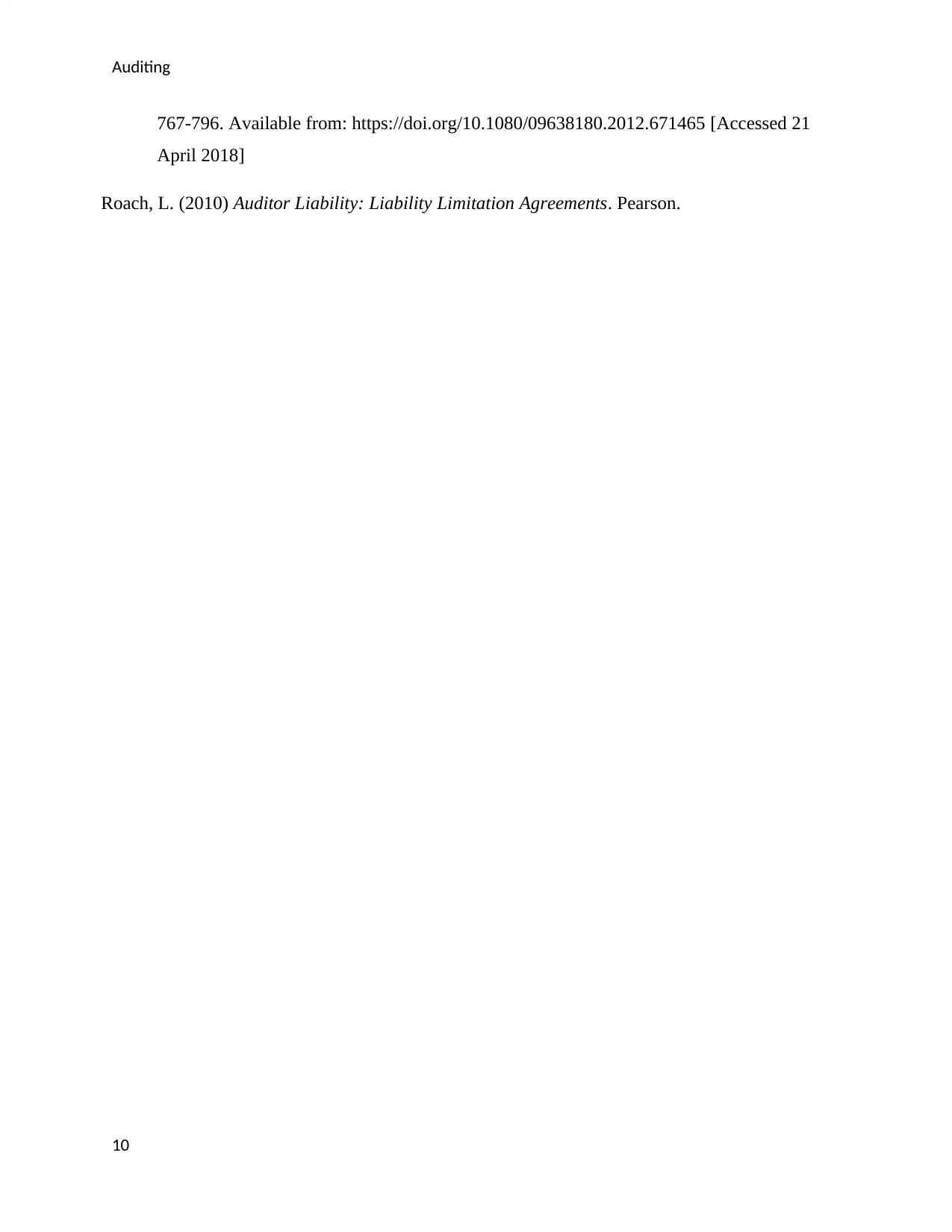
Auditing
767-796. Available from: https://doi.org/10.1080/09638180.2012.671465 [Accessed 21
April 2018]
Roach, L. (2010) Auditor Liability: Liability Limitation Agreements. Pearson.
10
767-796. Available from: https://doi.org/10.1080/09638180.2012.671465 [Accessed 21
April 2018]
Roach, L. (2010) Auditor Liability: Liability Limitation Agreements. Pearson.
10
1 out of 10
Related Documents
Your All-in-One AI-Powered Toolkit for Academic Success.
+13062052269
info@desklib.com
Available 24*7 on WhatsApp / Email
![[object Object]](/_next/static/media/star-bottom.7253800d.svg)
Unlock your academic potential
Copyright © 2020–2026 A2Z Services. All Rights Reserved. Developed and managed by ZUCOL.



